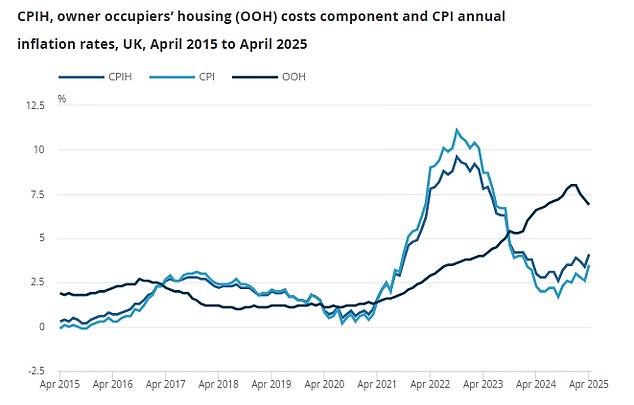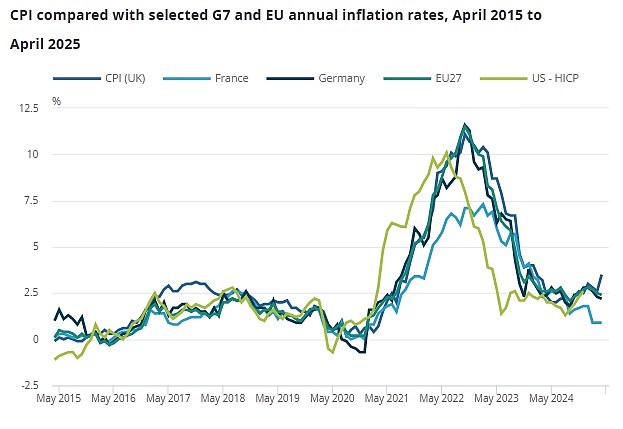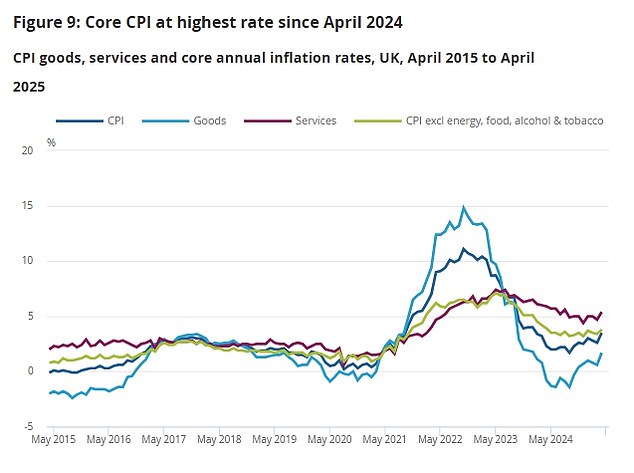UK inflation surged to its highest level for more than a year in ‘Awful April’ after households were hit by a raft of bill increases.
The headline CPI rate was up from 2.6 per cent in March to 3.5 per cent last month, a peak not seen since January 2024.
Worryingly, it was significantly more than the 3.3 per cent analysts had pencilled in, with Chancellor Rachel Reeves acknowledging the figures were ‘disappointing’. Core CPI – excluding energy, food, alcohol and tobacco – was also at the highest for a year.
The grim data will fuel Bank of England concerns about underling pressures, with chief economist Huw Pill having already warned that interest rate cuts have been too fast.
Experts immediately suggested that Threadneedle Street might pause reductions at the next monetary policy committee meeting next month. The Bank had forecast that inflation would top out at 3.5 per cent in the third quarter of the year.
It comes after Ofgem‘s energy price cap rose by 6.4 per cent in April, having fallen a year earlier, alongside a raft of bill rises for under-pressure households, including steep increases to water charges, council tax, mobile and broadband tariffs.

Chancellor Rachel Reeves acknowledged the latest figures were ‘disappointing’
ONS acting director-general Grant Fitzner said: ‘Significant increases in household bills caused inflation to climb steeply.
‘Gas and electricity bills rose this month compared with sharp falls at the same time last year due to changes to the Ofgem energy price cap.
‘Water and sewerage bills also rose strongly this year, as did vehicle excise duty, which all pushed the headline rate up to its highest level since the beginning of last year.’
Ms Reeves said: ‘I am disappointed with these figures because I know cost of living pressures are still weighing down on working people.
‘We are a long way from the double-digit inflation we saw under the previous administration, but I’m determined that we go further and faster to put more money in people’s pockets.
‘That’s why we have increased the minimum wage for millions of working people, frozen fuel duty to protect commuters and struck three trade deals in the past two weeks that will go towards cutting bills.’
However, shadow chancellor Sir Mel Stride squarely blamed Ms Reeves for the hike in inflation.
He said: ‘This morning’s news that inflation is up – and now well above the 2 per cent target – is worrying for families.
‘We left Labour with inflation bang on target, but Labour’s economic mismanagement is pushing up the cost of living for families – on top of the £3,500 hit to households from the Chancellor’s damaging jobs tax.
‘Higher inflation could also mean interest rates stay higher for longer, hitting family finances hard.



‘Families are paying the price for the Labour Chancellor’s choices.’












